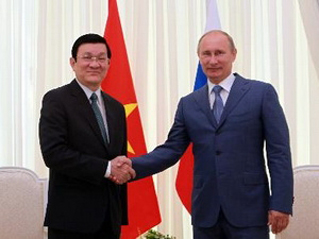VN, Russia issue joint statement
VGP – State President Truong Tan Sang and his Russian counterpart Vladimir Putin on Friday issued a joint statement after their talks in Sochi city, Russia.
 |
|
State President Truong Tan Sang (L) and Russian President Vladimir Putin, Sochi city, Russia, July 27 - Photo: VNA |
The two sides would enhance political dialogue at all levels and fortify cooperation between legislatures, sectors and localities.
President Putin spoke highly of Vietnam’s achievements gained during the renewal process as well as its increasing position and prestige on the international arena. Meanwhile, State President Sang voiced support for Russia’s long-term policy of modernizing the country and expanding its role in the region and the world.
The two leaders affirmed their determination to lift up the two-way trade turnover to US$5 billion by 2015. Vietnam and the customs alliance of Russia, Belarus and Kazakhstan are now preparing for possible free trade agreement negotiations.
Regarding nuclear energy cooperation, Russian side pledged to secure the progress of first nuclear power plant poroject in Vietnam.
In terms of oil and gas cooperation, the two leaders commit to creating favorable conditions for businesses like Rusvietpetro, Vietsovpetro, Gazpromviet and Vietgazprom, TNK-BP Management and Lukoil Overseas. They also affirmed to broaden cooperation in oil and gas exploitation in Vietnam’s continental shelf on the basis of international law, especially the 1982 UN Convention on the Law of the Sea.
Both sides acknowledged that military technique and national defense cooperation has been developing well, contributing to the joint efforts of coping with emerging security challenges to ensure peace, stability and sustainable development in the Asia-Pacific region.
The two Presidents stressed the necessity of widening cooperation in science-technology and education and training. The two countries are working toward building Vietnam-Russia Technology in Hanoi.
For multilateral aspect, the two sides said they support the formation of a new, fairer and more democratic world order, while realising that risks and challenges in the world politics and economics are increasing. They held that it is necessary to build a new world order based on the principles of multilaterality, supremacy of international law, fundamental principles of the UN Charter, including the respect of sovereignty, national integrity and non-intervention into internal affairs of nations.
Vietnam and Russia held that international security is comprehensive and inseparable, adding that it is not allowed to ensure security of a nation by harming that of others, including the expansion of military-politic alliance and the establishment of global and regional anti-missile defence systems.
Both sides were of the view that the United Nations holds the central role in coordinating international missions, including the guarantee of security and sustainable development. They agreed that the prerequisite to reform UN main agencies is the maximum consensus on the issue among UN member countries.
The two countries’ leaders stressed that the armed intervention in internal conflicts of sovereign nations and the imposition of unilateral sanction without appropriate attention to internal politic, ethnic, religious and cultural specificities and other characteristics contain risks of instability and increase tension in international relations.
Vietnam and Russia resolutely reject all plots of revising the World War II history that cast doubt on the decisive role of the people of the former Soviet Union in the victory over the Fascism and militarism.
Both sides supported G-20’s efforts in completing global economic and financial management for stable, sustainable and equal growth and the world monetary-financial system’s restructuring, fighting the protectionism, and giving more attention to development.
President Putin highly valued Vietnam’s role in activities of the Association of Southeast Asian Nations (ASEAN), and other regional and international links.
State President Sang voiced support for Russia’s strategic policy to unceasingly strengthen its position in Asia and the Pacific for the sake of peace and sustainable development in the region.
The two sides supported the establishment of an open, transparent, fair and cooperative security architecture in the region built on international law’s provisions and principles of non-alliance and consideration of legitimate interests of all countries.
The leaders welcomed the substantial implementation of cooperation between Russia and ASEAN.
Vietnam and Russia affirmed their determination to increase coordination to cope with new challenges and risks threatening security and sustainable development in the Asia-Pacific region, firstly within the framework of the ASEAN Regional Forum and the ASEAN Defence Ministers’ Meeting plus dialogue partners.
The two sides said territorial disputes and other disputes in the Asian-Pacific space should to be solved only by peaceful measures without the use of force or the threat to use force, based on the existing international law, particularly the UN Charter and the 1982 UN Convention on the Law of the Sea. They voiced support for the full implementation of the 2002 Declaration on the Conduct of Parties in the East Sea and the approach to the building of the Code of Conduct in the East Sea at an early date.
Vietnam and Russia affirmed the policy of expanding the cooperation within the framework of ‘Asia-Europe dialogue forum’, conference on interaction and confidence-building measures in Asia (CICA) and the East Asia Summit (EAS).
They also supported the inclusion of principle issues on regional security to the EAS’s agenda.
After theỉ talks, the to leaders witnessed the signing ceremony of some cooperative documents on agriculture, customs, legal assistance, culture, science and technology./.
By Hai Minh

